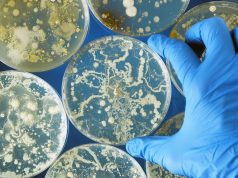Interaction identified between H. pylori infection and pathogenic variants in homologous-recombination genes
By Elana Gotkine HealthDay Reporter
THURSDAY, March 30, 2023 (HealthDay News) — Helicobacter pylori (H. pylori) infection modifies the increased risk for gastric cancer associated with germline pathogenic variants in cancer-predisposing genes, according to a study published in the March 30 issue of the New England Journal of Medicine.
Yoshiaki Usui, M.D., Ph.D., from the RIKEN Center for Integrative Medical Sciences in Yokohama, Japan, and colleagues examined the association between germline pathogenic variants in 27 cancer-predisposing genes and the risk for gastric cancer among 10,426 patients with gastric cancer and 38,153 controls. In addition, the combined effect of pathogenic variants and H. pylori infection status on the risk for gastric cancer was examined; cumulative risk was calculated in 1,433 patients with gastric cancer and 5,997 controls from the Hospital-based Epidemiologic Research Program at Aichi Cancer Center (HERPACC).
The researchers found that germline pathogenic variants in nine genes were associated with gastric cancer risk. With respect to the risk for gastric cancer in HERPACC, there was an interaction observed between H. pylori infection and pathogenic variants in homologous-recombination genes (relative excess risk due to the interaction, 16.01). Compared with noncarriers infected with H. pylori, individuals with H. pylori infection and a pathogenic variant had a higher cumulative risk for gastric cancer at age 85 years (45.5 versus 14.4 percent).
“Our results suggest that in persons known to carry a pathogenic variant in a homologous-recombination gene, evaluation and eradication of H. pylori infection may be particularly important,” the authors write.
Editorial (subscription or payment may be required)
Copyright © 2023 HealthDay. All rights reserved.








